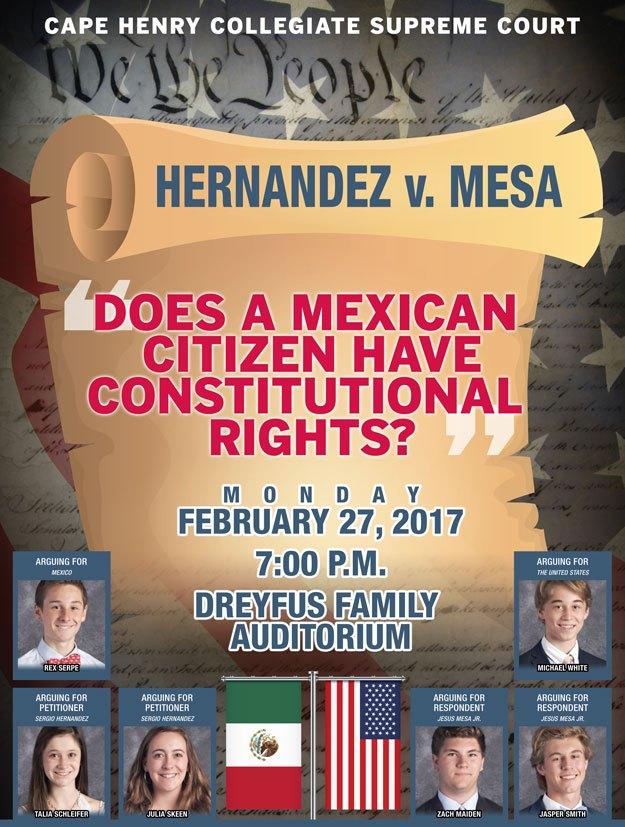Mesa Wins 6-3 in CHC Supreme Court Opinions
In the CAPE HENRY COLLEGIATE SUPREME COURT
Jesus Hernandez et al. v. Jesus Mesa, Jr.
OPINION BY Justice Theuer, in which Justices Garran, Jones, Stillman, Sawyer and Shepherd join.
PART I – The Fourth Amendment did not protect Sergio Hernandez,
Sergio Hernandez was shot and killed by respondent Jesus Mesa, Jr., a Border Patrol agent. Hernandez was on Mexican territory when he was killed; Mesa was on United States soil when he fired his weapon at Hernandez. As we have previously held, aliens with no connection to the United States are not within the scope of the Fourth Amendment. United States v. Verdugo-Urquidez, 494 U.S. 259 (1990). Hernandez argues that he had a connection to the United States because he was in a culvert along the border and had, just prior to his death, been on the United States’ side of the culvert. We reject the proposition that such incidental action creates a connection to the United States under the reasoning of Verdugo. Verdugo made clear that a connection must be “significant.” “[A]liens receive constitutional protections when they have come within the territory of the United States and developed substantial connections with this country.” Id. at 271.
Hernandez argues that our decision in Boumediene v Bush, 553 U.S. 723 (2008) modified the holding in Verdugo, making that holding inapplicable to areas where the United States enjoys de facto sovereignty. Hernandez argues that Mesa exercised de facto sovereignty over the culvert along the border on behalf of the United States and that the United States jointly maintained the culvert with Mexico. We disagree. The common law basis for the Suspension Clause at issue in Boumediene is very different from the common law basis of the Fourth Amendment and writs of assistance. We decline to extend the rationale of Boumediene to the Fourth Amendment. Furthermore, assuming, arguendo, that Boumediene’s holding did apply to the Fourth Amendment, that holding was predicated on our conclusion that Guantanamo was “within the constant jurisdiction of the United States.” 553 U.S. at 768-69. That cannot be said for the Mexican territory upon which Hernandez was killed. The United States had no de facto jurisdiction over the area of the culvert that was on Mexican territory. We decline to hold that foreign territory within range of firearms or other weapons on United States soil is thereby rendered subject to the jurisdiction of the United States.
Our decision today respects settled precedent among the Circuit Courts of Appeal based on Verdugo and appropriately conforms to our role. The application of American military power outside of the United States strongly cautions against any expansion of our jurisprudence to hold that foreign nationals enjoy constitutional protections rejected in Verdugo. Any such expansion is a matter for the branches of government empowered to administer the foreign policy of the United States under the Constitution.
PART II – Even if the Fourth Amendment had protected Sergio Hernandez,
this is not an appropriate suit under Bivens.
While our decision renders moot Hernandez’ second issue that he enjoys the right to sue for money damages against an officer of the United States under Bivens v. Six Unknown Federal Narcotics Agents, 403 U.S. 388 (1971), we note that the same respect for our role likewise counsels against our expansion of our jurisprudence to permit such a claim even were Hernandez to enjoy the protections of the Fourth Amendment. Congress is the appropriate branch to expand the right articulated in Bivens, and its inaction in the face of the events of the last sixteen years when the United States has been engaged in the application of military force throughout the globe convinces us that we should demur. Important issues of national security and the administration of the foreign affairs of the United States would be jeopardized were the Bivens right to be expanded to Hernandez.
For these reasons, the judgment of the United States Court of Appeals for the Fifth Circuit is affirmed.
DISSENTING OPINION BY Justice W. McGraw, in which Justices Horgan and Rafal join.
The dissent would permit this lawsuit by the Hernandez family to go forward for the following reasons.
PART I – The Fourth Amendment did protect Sergio Hernandez,
While the majority relies on the 1990 case of United States v Verdugo to deny the Hernandez family their day in court, the dissent believes that the more relevant precedent is the 2008 case of Boumediene v Bush. In Boumediene, the Court held that the application of Constitutional rights depends not just on the nationality of the victim, but also on other considerations as well. Specifically when granting Constitutional rights to a group of Algerians, the Boumediene court considered: (1) whether the right asserted is a “fundamental precept of liberty”; (2) the “citizenship and status” of the person asserting the right; (3) ‘the practical obstacles”, if any, that would make resolution of the claim difficult; and (4) the “physical location” where the events that gave rise to the claim occurred. An analysis of those same factors in this case leads to the conclusion that the Fourth Amendment did protect Sergio Hernandez.
First, Sergio lost his life at the hands of Officer Mesa and there is no more fundamental right than the right to life; in fact, the right to life is far more fundamental than the right to habeas corpus the foreign petitioners were granted in Boumediene. Second, Sergio was an unarmed teenager from a friendly neighboring nation while the Boumediene plaintiffs were Algerians who were captured in Serbia and detained as part of the war on terror. Third, excessive force suits like this one are commonplace in federal courts, and resolving the family’s claims one way or the other will not be difficult. And as far as the final factor, the incident occurred in an area over which the United States clearly had control. Sergio was standing in a fenced-in area just 20 yards south of an invisible border line when the only government official in the area, American border guard Jesus Mesa, who was standing in US territory and wearing a US uniform, fired US-issued bullets out of a US-issued weapon. Clearly, the United States, through Mesa, was exercising control over the fenced-in culvert at the time. If the Constitution protected the alleged enemy combatants in Boumediene, surely it protected the unarmed teenager Sergio.
PART II – Bivens grants the Hernandez family the right to sue.
The Bivens case clearly gives Sergio’s parents the right to sue in an effort to right this alleged wrong. Bivens grants plaintiffs a right to sue federal officials who have violated the plaintiffs’ Constitutional rights when (1) there are no alternative remedies available to the plaintiffs and (2) no special circumstances counsel against permitting the lawsuit. With respect to the first factor, the government concedes that if this lawsuit is dismissed, Sergio’s parents will be left with no other options. Second, permitting this suit to go forward will not adversely affect diplomatic relations or our military. With respect to diplomacy, the country of Mexico wants this suit to go forward; the difficult diplomatic issue arises not by allowing this suit but by dismissing it. Second, while the majority expresses concern about future lawsuits against military officials, a Bivens suit is a judicially crafted remedy so the Court can permit this suit against Officer Mesa while still maintaining the right to dismiss possible future Bivens suits against military officials. See e.g., United States v. Stanley, 108 S.Ct. 3054 (1987) (dismissing a Bivens suit against military officers by another member of the military).
Jesus Mesa Jr. is alleged to have shot an unarmed teenager who was hiding behind a pillar at the time. All the teenager’s family is asking for is the chance to make their case to a jury. They should get their day in court.



